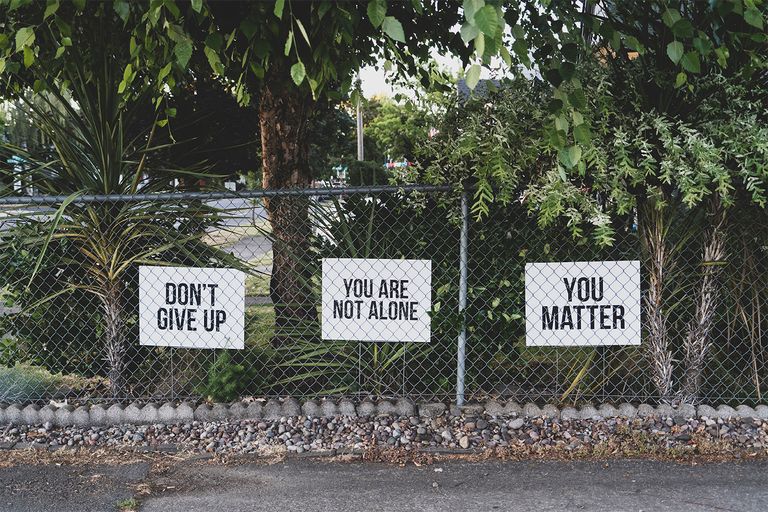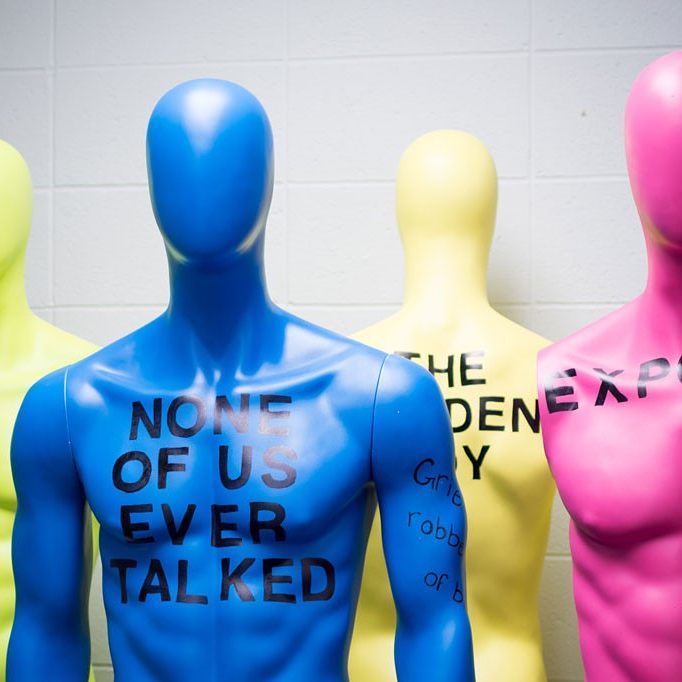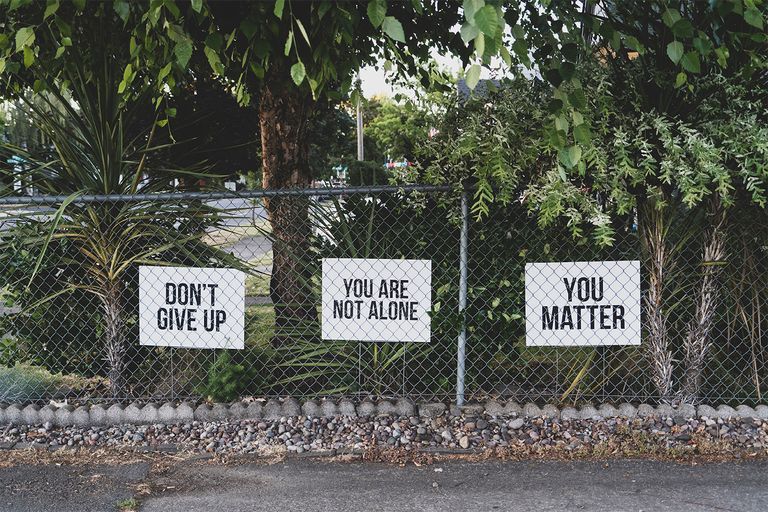
There are many different factors that can lead to someone experiencing suicidal feelings. Mental health conditions such as depression, bipolar disorder or schizophrenia can make a person more likely to have suicidal thoughts – as well as other factors like loss, isolation, debt or poor job security.
According to the Samaritans, in the UK, last year, there were 6,507 suicides. We know - shocking statistic! Even though mental health issues are often not openly discussed, they’re a lot more common than you may think. Sadly, some people are just incredibly good at hiding them.
There is still a fear that opening up about your mental illness will lead to judgement. Especially within men, feeling they should just 'man up'. Mental health has no gender and tears do not signify weakness. It can feel like an impossible task to explain that you just can’t muster up the courage to have a shower and leave the house. Remember, talking about mental illness can be a helpful part of recovery.
In this hectic, ‘always on’ world of today, that sense of belonging and social connectedness can be overlooked. Yet, being part of a community has a massively positive effect on our mental health and emotional wellbeing. Hence, what we’re doing with our Moda neighbourhoods - to give everyone a community and a friendly face to turn to. Our onsite team will also be Mental Health First aiders.
Today is World Suicide Prevention Day, so we checked in with our partner hero for some tips on spotting when a friend in need may need support...


What is World Suicide Prevention Day?
Every year organisations and communities around the world come together to raise awareness on how we can create a world where fewer people die by suicide. World Suicide Prevention Day is organised by the International Association for Suicide Prevention (IASP
According to IASP, every year suicide is among the top 20 leading causes of death globally for people of all ages. It is responsible for over 800,000 deaths, which equates to one suicide every 40 seconds. These statics are quite frightening. Suicide and self-harm are not mental health problems themselves, but they are linked with mental distress.
IASP is raising awareness by asking people to join in Cycling Around the Globe. In which they’re encouraging participants to collectively cycle the globe. You can also take part in their Light a Candle event, in which they invite participants to light a candle near a window at 8pm on WSPD as a symbol of support for suicide prevention.
Spotting the signs
Anyone can have mental health challenges at any time. It’s important to be able to spot the signs and symptoms. Although it’s easy to become lost in your own bubble, just by noticing someone is struggling and reaching out can make a huge difference. So check-in on your strong friend, your funny friend and the quiet friend.
How to know when to reach out? Mental Health expert Ashleigh Turner, from hero, recommends that we keep an eye out for:
Mood: Long stages of low mood and mood swings that are out of chara
Motivation: A lack of motivation and drive to do anything
Sleep: Struggling with sleep can also be a symptom of mental ill-health
Withdrawal: Not wanting to get out of bed, attend social events or be around people
Recent Trauma: Traumatic events in life such as losing a loved one, breakdown of relationships or job loss can trigger mental ill-health
Self Care: Not taking care of themselves with personal hygiene and appearance
It’s tough to know what to do when you can clearly see someone is struggling. Whatever you do, don't just say 'cheer up'. Don't say 'things could be worse'. Instead, say 'that must be really difficult' and 'how can I help?' Even the smallest and simplest of gestures can make the world of difference. Smiling, being kind and just listening - super easy. Help them with the chores they've been avoiding, like the laundry, washing the pots or taking out the trash.
Below are some tips on helping a mate in need or even yourself…


Check-in: Say hello, try to interact with others and take interest in them - a smile to someone else can change their whole day and outlook. Just letting them know your thinking about them can make a huge difference. Ask what they need from you and do it.
Keep active: While being physically strong and mentally strong are different things, exercising can help improve the way we feel. Cardio activities such as running or swimming can really help to get the blood pumping and produce natural hormones, such as adrenaline and cortisol, which reduce stress and support mental wellness. Suggesting this will cause objection, exercise together to make it less daunting.
Get outside: Even though they may not want to. In fact, they’ll initially refuse, but leaving the house is good. Fresh air is really good...
A study from BioScience Journal (2018) showed that the positive effects of a single exposure to nature – for example, a walk, run or stint in the garden – can last for 7 hours after an individual has experienced it. Take time to enjoy the fresh air, connect with nature come rain or shine - it could really leave you feeling happier all day!
Sharing is caring: You’ve probably heard the saying that a problem shared is a problem halved. Mental health experts still advocate this. You’ll often find that people share similar experiences and that you aren’t alone or in the minority by any means. As well as hearing other people’s personal accounts, it can also help to hear your own thoughts spoken aloud as this can help us to understand them.
It’s okay to talk about your problems, your fears, your doubts, and even your own insecurities. Talking about thoughts and emotions is always a good thing, it’s healing.
Social media: Use social media in a positive way - share tips that have helped you and keep an eye out for local events. Also, if you are feeling a bit overwhelmed and busy minded, take some time away from social media and try to be as present as possible.
Let's talk about it
Ashleigh says “one of the most important ways to support your mental wellbeing is to use the power of sharing! There are so many amazing services out there - help and support is available for everyone, no matter what they’re going through.
Different things work for different people. For some people, CBT or hypnotherapy can be perfect, but if this doesn’t work for someone it doesn’t mean they are a ‘lost cause’. It’s important to keep accessing the different support networks and services available. Don’t give up."
**
Useful resources**
A really sucky thing about mental illness, amongst many other things, is its ability to make you incapable of completing normal tasks. It's okay not to have all the answers, you do not need to be your friend's therapist.
Sayin the 'S' word, won't make it happen. Together, we can beat the stigma of mental health. It's never too early or too late to support someone.
[Happy Place Podcast (http://www.officialfearnecotton.com/news/2018/2/26/happy-place-podcast)
